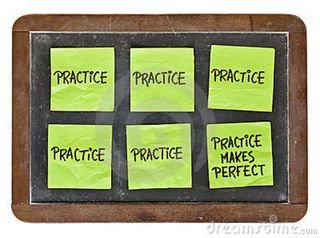How to Establish a Regular Writing Practice
I love headlines and titles that promise me they are going to teach me something basic, like a few years ago when a book came out titled, How to Think. Now that's basic. So I was going to title this How to Practice but then I thought perhaps that was too vague, because one can practice a lot of things besides writing. Like the ukelele, or meditation, or making perfect. 
So here we go with some advice on how to establish a regular writing practice.
The impetus for this is an article by Antonya Nelson about her tips rules for writing that a friend sent. The rule I keep pondering is this one, #8:
Be tolerant of dry spells. Understand that being a writer is not illustrated solely by the act of typing. Mulling, reading, meditating, lollygagging, cooking, joking, traveling, watching television—all activity, as pursued by a writing sensibility, is potentially the stuff of writing.
I am the first to acknowledge that creativity comes in cycles, and sometimes you just have to wait it out until it comes back again. But I also know, and have observed in myself and others, that "being tolerant of dry spells" too often turns into Not Writing. Period. And that those dry spells you are so happily tolerating can stretch for months and then years and then a lifetime and then there you are–you've become that person who put her unfinished novel in the drawer and there it sits for your children to find after you are dead.
So that's why I think that a regular writing practice is a good idea. You don't have to be writing brilliant words on your potential bestseller of a novel regularly. You can write in a journal, or just free-write on prompts, or scrawl a one-stanza poem every day, or nearly every day. In my humble experience, writing, no matter what kind, leads to more writing. And if you're a writer, as you and I are, you are not truly happy unless you are writing something.
So, write already. Here's help for how:
1. Follow your natural rhythms. I'm a morning writer. I love getting up at 5:30 and heading straight to the page. By evening all I want to do is down sip a glass of wine and watch TV or read. My brain is not alive enough for writing. But you may be the opposite–I know plenty of people are. Go with what works best for you. I know, simple advice, but I myself have spent years trying to twist myself into what others think best and I suspect you have, too. Because that's what we humans do, crazily enough.
2. Define what regular means. Maybe regular to you is not once a day, but two or three times a week. Or once a week. Whatever. My whole life and my coaching are built around encouraging people to discover what's best for them and then do more of it. But here is where I step away from that platform and remind you that in defining regular, you need to commit to more than once a year. Or even once a month. Because practice means "the actual application or use of an idea, belief, or method as opposed to theories about such application or use." (I got that from consulting the Google.)
3. Set a reasonable goal. I know, I hate the G word, too. I really do. I start squirming in discomfort when I read books written by logical, left-brained business types about accountability and all that. And sometimes I rebel against my own goals. But I still think they are useful. Set yourself a word count or page goal and have at it.
4. Lower your standards. You don't have to write the whole novel in one week, nor should you. Books get written one word at a time, so all you have to do is get yourself to the page and write a few of those words. Julia Cameron talks about how three pages a day doesn't seem like much–but at the end of the month you've got 90 pages, which is one-third of a novel. I read a book last summer (forgive me, the name of it has escaped into the ether) in which the author recommended a writing practice of a few hundred words a day. That, my friends, is achievable by anyone.
5. If all else fails, give up. Walk away from it. Throw up your hands and say forget it. Release your dream of being a writer. Because here's what I think: you really do want to be a writer. And writers write. So if you give it all up and are able to stay away from it and not write, then you're not really a writer. But if you really are a writer–and I'm certain you are–you will not be able to stay away. And you'll figure out a way to make it a regular practice in your life.
What are you best strategies for making writing a regular practice? Please share in the comments!

J.D.
Wow, the whip-cracking Charlotte is back. These are all good. Maybe not so much #1. Writing is sometimes work, which is not part of my natural rhythm. I like the advice from Michael Connelley I read about six weeks ago. If your stuck, back up a few pages and start reading. You’ll blow through that barrier. I think it is a good way to gain interest in your story again. If you’re interested, you will write.
Charlotte Dixon
You know, I think that's really true. If you have a story that you don't care about, you won't write. I remember I had a novel I was struggling with a year or so ago and then I realized that I hated the main character and was bored every time I had to write her. So it never happened. Thanks, J.D.
Zan Marie
Perfect reminders, Charlotte! Remembering that the deadlines we set for ourselves can be counter productive is important, too.
Don Williams
Thanks for the five points Charlotte. I must admit that getting into some kind of a regular writing practice mode is a lot harder for me than it sounds.
Not sure if a new “Writer Emergency Pack”, currently being promoted in a video from KickStarter is useful, but you can check it out in the video link below:
https://www.kickstarter.com/projects/913409803/writer-emergency-pack-helping-writers-get-unstuck
Charlotte Dixon
Thanks, Zan Marie!
Charlotte Dixon
Oh wow, Don, thanks for the link, I'm checking it out now!
shabeena
OMG thats sooo true, I want to write but always feel.i’m somwhere where the atmoshere has disapeared & taken the cold & the warmth with it & i need to feel wet and feel the heat 2 be able to write. Great advice. At the mo i’m inthe dry state aswell But there is THIS gravity pulling inside of me that brings me TO the paper everytime. But i can never get my words down.
Charlotte Dixon
I love your image of "no gravity pulling me down" to the page. That's what it's all about! Thanks for commenting.